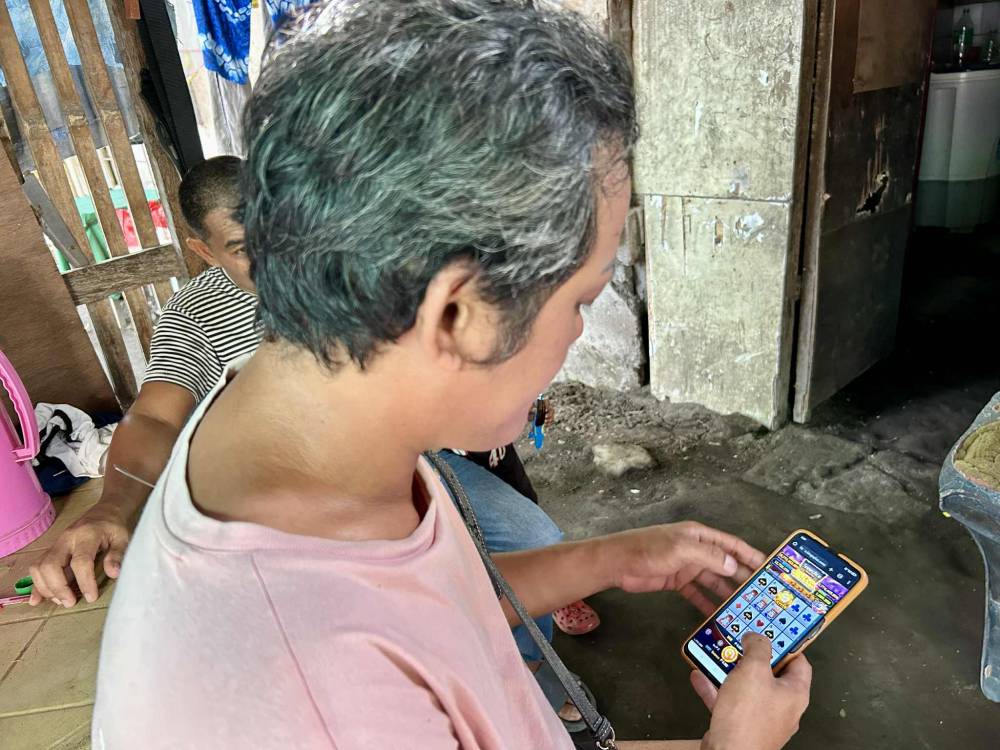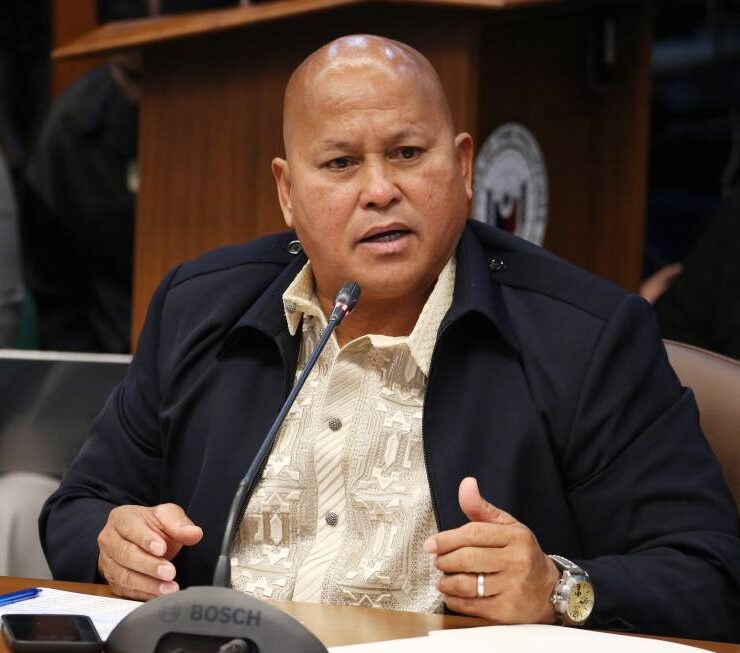E-gamblers confess: ‘I sold my soul’

“I sold my soul to the devil,” said Mae (not her real name), a 25-year-old woman who confessed to being addicted to online gaming — an obsession that has cost her not only her savings but also her relationships, peace of mind, and sense of self.
In an interview on Wednesday, Mae, a resident of San Antonio, Zambales, recounted how a simple, fun way to pass the time gradually turned into an uncontrollable habit.
She soon found herself glued to her mobile phone screen for hours, neglecting household chores and daily tasks, and spending less time with her family.
“My addiction didn’t just hurt me — it hurt the people I care about,” she said softly. “I didn’t see it before, but now I know it broke our trust and made us grow apart.”
Despite not being a regular gambler, Mae said she was lured into playing an online casino game called Scatter in July last year, enticed by the promise of instant money.
Initially, she won P15,000, which led her to continue playing. However, she soon found herself losing more than she was winning.
When she calculated her losses, she was shocked to discover that her debt had ballooned to almost P100,000, prompting her to stop playing in October the same year.
Ruined lives
Despite the country’s crackdown on offshore gaming operators, online gambling has exploded, affecting many Filipinos and their families.
The Philippine Amusement and Gaming Corporation (Pagcor) and the Department of Information and Communications Technology (DICT) have said they are taking down thousands of illegal gaming websites operating in the country amid concerns over their social impact.
While a game like Scatter cannot be banned as it is offered by licensed gaming websites, families can get their kin banned from playing such games by lodging a report with Pagcor.
Mae, now debt-free, is grateful that she came to her senses on her own without the intervention of her family, who could have gone to Pagcor to have her banned.
“It (online gambling) ruins lives,” she warned, urging others to stop before it’s too late.
Ease of access
Over in Tagbilaran City, Herbert (family name withheld upon his request) went through the same experience.
Introduced to mobile e-games by his friends, he found himself hooked not just by the thrill of winning, but also by the ease of access provided by digital wallets like GCash.
“The games made me feel occupied,” said Herbert, 34, a resident of Pamaong Street in Barangay Cogon, Tagbilaran City.
The app offered various live games such as Pula Puti, Color Game, and Baccarat, which became part of his daily routine. With bets ranging from as low as P5 to as high as P500, the temptation was just a tap away.
Initially, he experienced a winning streak playing Bingo Plus slots, which helped him provide for some family needs. But the fortune was fleeting.
“At first, I was winning big. There was this one slot machine that gave huge rewards. But every time I won, I ended up spending everything back and adding more money.”
I’ve already lost my savings,” he added. “I just computed everything I spent — it has (already reached) close to P50,000. I feel like such a loser.”
Despite the losses, Herbert continues to play, though with smaller bets of P5 or P10. However, the impact has extended beyond his finances — the addiction has also caused strain in his relationships.
His partner, CheChe, voiced out her frustration: “I don’t understand why regulatory bodies are not holding GCash accountable for allowing this. As soon as you open the app, gambling ads are front and center. This is the new e-sabong for many with gambling problems.”
Digital addiction
For Paul, 15, a student, it was a low-stakes activity at first. He began playing Scatter Slots daily by betting P10 or P20 from his allowance. When he felt lucky, he went as high as P1,000.
“There was one time I kept winning for hours. It made me believe I could actually beat the system,” he said, adding that many of his classmates were also into e-gaming.
With online gambling apps increasingly accessible, particularly through GCash and similar platforms, concerns are growing over how they may be enabling a new wave of digital addiction, especially among the youth.
Authorities have yet to take decisive steps to address the issue but families and advocates are calling for greater regulation, transparency, and education on the risks of online gambling.
One-day millionaire
Lendon Purawan, 39, a manicurist in Ligao City, Albay, rapidly went down the rabbit hole of electronic gambling after a friend introduced him to an online casino just last May 15.
“We were drinking when my friend told me about it. I gave it a try, and it actually made me feel relaxed,” Purawan told the Inquirer.
With a starting capital of just P100, Purawan said he hit a jackpot that earned him P11,500 in five hours. “It made me a one-day millionaire. Just imagine winning that much in such a short time!”
Following his big win, Purawan said he immediately withdrew the money through GCash and used it to lend money to friends, pay his monthly motorcycle dues, and treat them to snacks.
“In total, I’ve already won around P45,000 from just P100 in capital. But I’ve also lost about P15,000,” he shared.
However, what began as a way to unwind has since become a source of financial anxiety. Purawan said he would often feel uneasy when he could not play, especially when he had no money to bet.
“I end up borrowing money just to play. Sadly, I’ve lost many times, and it’s difficult to pay off my debts,” he said.
Still, he’s ambivalent about the activity. Asked how he would feel if electronic gambling were banned, Purawan said it would be a “huge loss.”
“I’d feel sad because it really helps me meet my basic daily needs, especially buying food for my family. More than anything, it’s a stress reliever. I hope it won’t be removed, or at least they won’t raise the minimum bet so I can still play and win,” he said.
Hooked on e-sabong
In Tagbilaran City’s Sagkahan district, it was online sabong (cockfighting) that got “Janiel” (not his real name) hooked.
“I always find a way to get money just to satisfy my craving for talpak,” he said, using the street term for betting on cockfights.
Janiel, 34, said his gambling problem worsened at the height of the COVID-19 pandemic, since “there was nothing much to do during the lockdowns.”
At the time, he was working as a company driver for a local business establishment. But his growing dependence on online gambling led to absenteeism and poor work performance, eventually resulting in the loss of his job.
What started as small bets ranging from P50 to P100 quickly escalated to wagers as high as P5,000. With only a daily income of around P400 back then, Janiel soon found himself drowning in debt.
“I would even ask strangers for money just so I could place a bet. I’d call friends in the middle of the night, making up excuses so they’d lend me a few hundred pesos,” he said.
“I grew up with cockfighting. My father was into it, so was my brother, and practically all the adult men in our neighborhood,” he recalled. “It was normal to see men cradling gamecocks, talking about bets.”
Janiel, who lives with his common-law wife, said his addiction has taken a toll on their relationship. “I’ve hurt her, my family, and even lost good friends along the way.”
His former employer repeatedly warned him about his gambling habits before eventually letting him go.
Now unemployed, Janiel still finds himself drawn to the thrill of online betting. “I really don’t know how to stop. Only God knows,” he said, his voice trailing off.





















